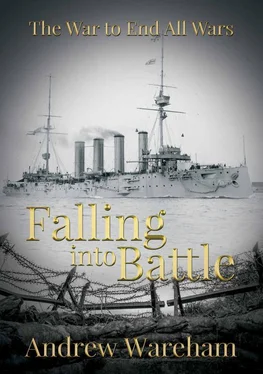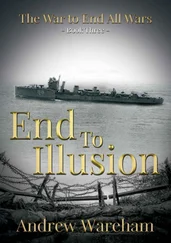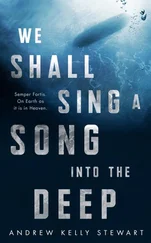“Not yet. There is word of eligibility for promotion courses coming earlier – you might be able to go off to Greenwich after just six months as a sub. Was I you, though, I would wait until autumn before applying. If war comes this year, then it ought to be in mid to late summer – good marching time and the harvest due to come in and provide food for the army that steals it. If it hasn’t happened by mid-September, it won’t this year and you can spend winter ashore in the classroom. You want to be at sea when the war comes – too good a chance to miss.”
The captain agreed.
“You look as if you had a good time in Paris, young man. Got up to all of the things one does there, no doubt. Good for you! What do you know about the Lewis Gun?”
“Only what Mr Dacres has just told me, sir.”
“Well said! We are getting a pair of them, together with a dozen of Lee-Enfields to keep on the rack in the wardroom with the revolvers. Their Lordships have also issued seventy cutlasses – one apiece for the crew, would you believe!”
Simon kept a straight face.
“I am sure cutlasses will be useful if we get involved in boardings, sir. Perhaps they think we can attach them to the torpedoes, Boadicea style.”
Captain Smallwood thought that was funny – he would suggest it to the Captain (Destroyers) at their next meeting.
“Captain D will take it up as his own joke, of course. It will be known through the fleet inside three months. Best it shouldn’t have your name attached, Sub. Junior officers ain’t allowed to be amusing. Anyway, to get back to the point. You will take charge of any boarding party. Nominate twelve ratings and a petty officer – a leading hand that will have to be – to carry rifles and a revolver for the PO. And cutlasses, I suppose – no bayonets issued. You will also have the Lewises as well as the forward four inch. Mr Harker will show you how to load, fire and clear the Lewises. Exercise the hands with their rifles. Throw an oil can over the side as a target when we’re at sea. Are you any good with a revolver?”
Simon shook his head.
“Fired one, sir, on occasion at Dartmouth. Hit the back wall sometimes on the indoor range.”
“Keep to no more than six feet distant. Should work that close. Thing is, it’s assumed that Holland and Denmark and Norway and Sweden will stay out of the war, be neutrals and, obviously, passing through the North Sea. There will be a need to board and check them. That will be you.”
“Which boat, sir?”
“Good question. Starboard cutter. Speak to the Coxswain – he can arrange that.”
The Coxswain was the most senior of the ratings, the Navy’s equivalent of a regimental sergeant major. He knew everything and was the final word aboard on seamanship; he also took the wheel in action. Simon knew that the Coxswain was a far more important figure than him and habitually addressed him with circumspection; among other things, he was twenty years his senior.
He looked around the tiny deck, spotted the coxswain inspecting the rear torpedo tube, walked down to him rather than calling the man to come to the bridge.
“Morning, Coxswain.”
“Good morning, sir. Just examining the mess the dockyard have left behind here, sir. Slapdash as ever, sir!”
The deck railings had been replaced and the paint job was less than precise. The railings were only mounted in harbour and were then visible to visitors or those passing by.
“Not good enough, Coxswain. It should not be too difficult to spread grey paint evenly.”
“You might have thought so, sir!”
“I am put in charge of our boarding party, Coxswain, and of the two new Lewis Guns we are to have at the bridge. Twelve men with rifles and a leading hand, probably to use the starboard cutter. Will you select the party for me?”
It went without saying that he would, but it was polite to ask.
“You are to be Boarding Officer, sir, for the inspection of neutrals?”
“That is the intent.”
“Always the chance of disguised raiders as well, sir. Merchant ships with false cabins or deck cargo concealing guns.”
“Hadn’t thought of that, Coxswain. I was more concerned about contraband cargo.”
“Not so much of a problem in the southern reaches of the North Sea. Outbound from Germany would not be carrying much at all. Inbound would have already passed through the Channel and will have been checked there.”
“So, it will be raiders to be concerned about… Commerce raiders would go northabout rather than risk being repeatedly stopped passing through the Channel. Any ship here would have it in mind to attack the traffic from Dover to Calais and the Belgian ports. Risky, but not impossible.”
The coxswain thought it highly unlikely, but it was good for sublieutenants to think for themselves – they needed to exercise the brain they possessed, which was sometimes considerable.
They exercised in harbour at first, piling into the cutter, rifles in hand, and rowing hard for a cable before returning to be picked up. The first attempts were inclined to be comical – the rifles were cumbersome and tended to get everywhere. The sick berth attendant put a number of stitches into faces that had been poked by the muzzle of the next man in line. The Coxswain stopped the fights that resulted afterwards.
A week and they had mastered entering and leaving the boat laden with their equipment. Simon added cutlasses at that point, nervously. None of them killed each other.
They were left with one simple and effectively insoluble problem which Simon took to Dacres.
“The cutter, sir. It’s at water level, with us in it. What do we do when we come alongside a ship with perhaps twelve feet of freeboard?”
“Wondered when that would occur to you, Sub! Call for a line and climb up. If they won’t cooperate, throw a grapnel, hook on and scramble up that way. If they are still feeling stroppy, they will cut your line on the hook, and then you signal Sheldrake and we put a burst of machine gun fire over their bridge. If they are still unwilling, then they are hostile and you will sheer off while Mr Harker puts a few rounds of four inch and twelve pounders into their hull. Odds are they will be armed and will shoot you to hell and gone in that case, of course!”
Simon thought for a while.
“What you are saying, sir, is that if they are innocent and harmless, they will help us aboard and we will achieve nothing, except for irritating them for having to stop on the high seas. If they are enemy, then we have given them the chance to cause us casualties by shooting up our boat.”
“Well put, Sub. Tell me what else we can do.”
“Nothing at all, sir. Will we enforce neutral shipping lanes? All traffic to follow specified and protected channels?”
“Yes. Of course, we are dealing with merchant seamen. There is no guarantee that a neutral will either know of the existence of the lanes or be able to navigate well enough to find them. A disguised naval raider, on the other hand, will have good charts and the ability to use them.”
“Heads, they win; tails, we lose. That’s not a very clever game to play, sir.”
“It’s the only game in town. In any case, you’re playing it, not me!”
“Sublieutenants are, as is well known, the least valuable form of maritime life, sir. A lot of them about, as well…”
“Exactly so, Sub. As so often, you display a deep perception of the realities of naval life! The sooner you achieve promotion, the quicker you will be able to pass the buck to your juniors. Look on the bright side. If war comes, we may well have a mid appointed to us. Guess who gets boarding duty then.”
“Bright, keen and enthusiastic – we need a midshipman, sir. How can we survive without one?”
Читать дальше












